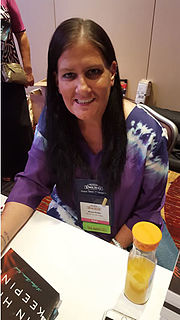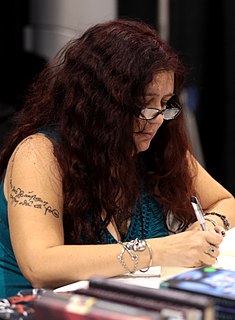A Quote by Hunter S. Thompson
The waitress had the appearance of a very old hooker who had finally found her place in life
Related Quotes
I saw what I had been fighting for: It was for me, a scared child, who had run away a long time ago to what I had imagined was a safer place. And hiding in this place, behind my invisible barriers, I knew what lay on the other side: Her side attacks. Her secret weapons. Her uncanny ability to find my weakest spots. But in the brief instant that I had peered over the barriers I could finally see what was finally there: an old woman, a wok for her armor, a knitting needle for her sword, getting a little crabby as she waited patiently for her daughter to invite her in.
At that moment a very good thing was happening to her. Four good things had happened to her, in fact, since she came to Misselthwaite Manor. She had felt as if she had understood a robin and that he had understood her; she had run in the wind until her blood had grown warm; she had been healthily hungry for the first time in her life; and she had found out what it was to be sorry for someone.
This person had arrived, he had illuminated her, he had ensorcelled her with notions of miracle and beauty, he had both understood and misunderstood her, he had married her, he had broken her heart, he had looked upon her with those sad and hopeless eyes, he had accepted his banishment, and now he was gone. What a stark and stunning thing was life- that such a cataclysm can enter and depart so quickly, and leave such wreckage behind!
Occasionally, on screen, Barbara [Stanwyck] had a wary, watchful quality about her that I've noticed in other people who had bad childhoods; they tend to keep an eye on life because they don't think it can be trusted. After her mother was killed by a streetcar, she had been raised in Brooklyn by her sisters, and from things she said, I believe she had been abused as a child. She had lived an entirely different life than mine, that's for sure, which is one reason I found her so fascinating. I think her early life was one reason she had such authenticity as an actress, and as a person.
But this was that view of human destiny which she had most passionately hated and rejected: the view that man was ever to be drawn by some vision of the unattainable shining ahead, doomed ever to aspire, but not to achieve. Her life and her values could not bring her to that, she thought; she had never found beauty in longing for the impossible and had never found the possible to be beyond her reach.
I found her lying on her stomach, her hind legs stretched out straight, and her front feet folded back under her chest. She had laid her head on his grave. I saw the trail where she had dragged herself through the leaves. The way she lay there, I thought she was alive. I called her name. She made no movement. With the last ounce of strength in her body, she had dragged herself to the grave of Old Dan.
I took my coffee into the dining room and settled down with the morning paper. A woman in New York had had twins in a taxi. A woman in Ohio had just had her seventeenth child. A twelve-year-old girl in Mexico had given birth to a thirteen-pound boy. The lead article on the woman's page was about how to adjust the older child to the new baby. I finally found an account of an axe murder on page seventeen, and held my coffee cup up to my face to see if the steam might revive me.
As she had been walking from the ward to that room, she had felt such pure hatred that now she had no more rancor left in her heart. She had finally allowed her negative feelings to surface, feelings that had been repressed for years in her soul. She had actually FELT them, and they were no longer necessary, they could leave.

































